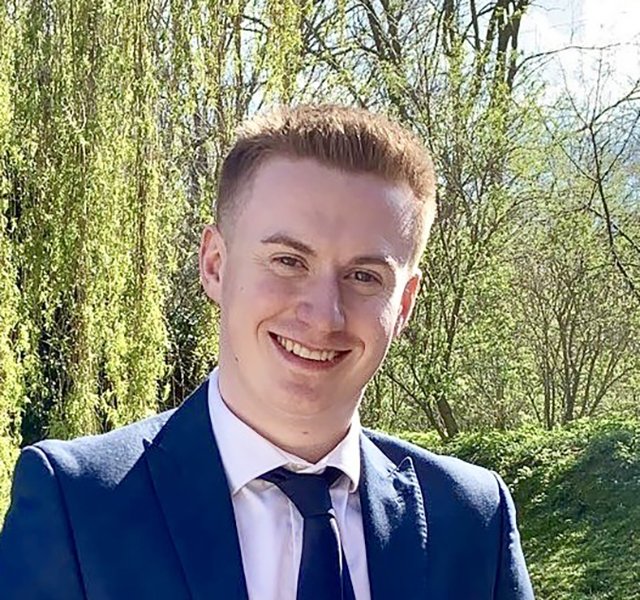Dr Liam Barrett has been awarded a joint British Geriatrics Society/Dunhill Medical Trust Doctoral Training Fellowship to carry out PhD research benefiting the healthcare of older people. The Fellowships aim to support research projects that have the potential to prevent, delay or reduce future health and social care requirements and to improve older people’s quality of life. Dr Barrett’s award is funded under the fifth round of the Fellowship scheme, which has been running each year since 2019.
Dr Barrett is an Emergency Medicine Trainee at Addenbrookes Hospital, Cambridge. With full funding through the BGS/DMT Fellowship, Dr Barrett will undertake a DPhil (Doctor of Philosophy) in Medical Sciences at the University of Oxford, starting in October 2024. The focus of his doctoral research is to study the effect of ageing and of blood thinners, which are increasingly prescribed in older adults, on the body’s bleeding and clotting response to traumatic injuries, such as hip fractures.
It is already known that some patients who bleed after an injury (even without taking blood thinners) have problems in forming blood clots properly. Doctors often worry that patients requiring surgery for a broken bone may bleed more if they are taking a blood thinning medicine. Sometimes they recommend delaying surgery to reduce the risk of bleeding. However, older adults with broken hips suffer from other problems, such as infections, and may have an increased risk of dying if their operation is delayed.
Shortly after an injury, patients are more likely to bleed, but even as early as three hours after the injury, the body starts to form clots more easily. Recent data have shown that older adults have both increased clot-forming ability and increased clot breakdown once formed, compared to younger adults. In contrast, blood thinners primarily work by reducing the ability to form clots. It is thought that the increased clot-forming ability in older adults may counteract the effects of the blood thinners, thereby reducing the risk of bleeding by the time of surgery. Consequently, these research findings could reduce concerns about bleeding in older adults and help prevent delays to their surgery.
Dr Barrett’s Fellowship will look at special cells inside blood vessels that help form blood clots, comparing how these cells work in both younger and older adults and how they react to both injury and blood thinning medicine. A greater understanding will help guide decisions about pausing these medicines after injury and whether older adults need to have their surgery delayed or not.
Dr Liam Barrett, recipient of the Doctoral Fellowship, commented:
I am delighted to be awarded a Doctoral Research Training Fellowship from the Dunhill Medical Trust/ British Geriatrics Society. This is a prestigious fellowship which provides me with the time and resources needed to study the effects of ageing and blood thinners on clotting in older people with traumatic injuries, such as hip fractures. It is an exciting opportunity to enhance my skills to be a future research leader and is a major step in my career as an Emergency Medicine Clinical Academic. I am very grateful for the support, which allows me to pursue my passion and to contribute important research aimed at improving the treatments and outcomes for older people following trauma.
Professor Adam Gordon, President of the British Geriatrics Society, commented:
A fundamental aim of the BGS/DMT PhD fellowships is to fund researchers who can generate insights into clinically meaningfully questions that will improve healthcare of older people. It is increasingly common for older people with frailty who are on blood thinners to present to hospital with trauma. Sometimes it is not clear what we should do about blood thinning treatments or whether to delay potentially life-saving operations. Dr Barrett’s research promises to help plug this gap in our knowledge to help us deliver better care. I’m very excited to be supporting him on his research journey.
Susan Kay, Chief Executive of the Dunhill Medical Trust, commented:
The need for research to be inclusive of older people is essential if we’re to deliver suitable treatments and care in our ageing society so we’re really pleased to be supporting this fellowship. Our shared principles and values with the BGS – and particularly our shared desire to improve capacity in ageing-related research - mean that our partnership goes from strength to strength.


